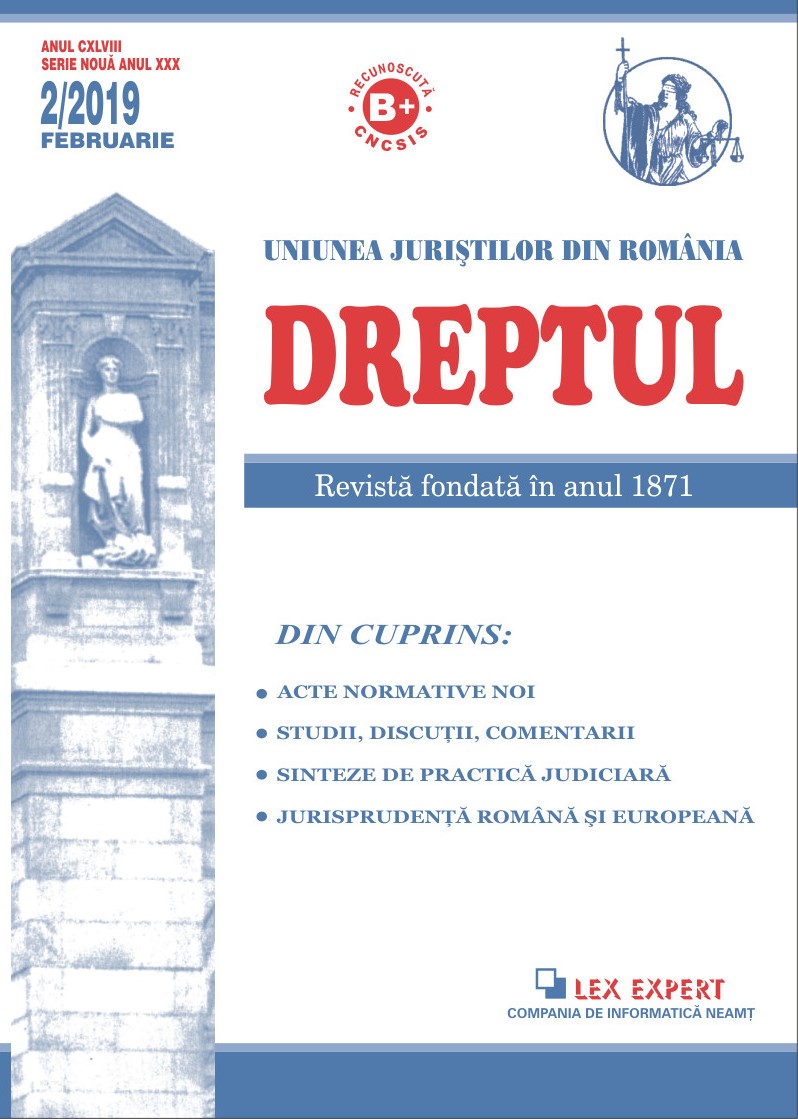Aspecte de procedură privind exercitarea acțiunii în atragerea răspunderii administratorului statutar în cadrul procedurii insolvenței împotriva moștenitorilor acestuia, în cazul decesului administratorului statutar
Procedural aspects concerning the exercise of the action for engaging the liability of the statutory administrator within the insolvency proceedings against his heirs, in case of death of the statutory administrator
Author(s): Gabriel NăsuiSubject(s): Law, Constitution, Jurisprudence, Commercial Law
Published by: Uniunea Juriștilor din România
Keywords: statutory director (administrator); patrimonial liability; heir; insolvency; mandate; company contract;
Summary/Abstract: The company’s entry into insolvency proceedings may be the result of an unfavourable economic situation or the abusive or negligent attitude of the governing bodies may contribute to this outcome. Sometimes people outside the company may have exercised a direct or indirect control of the company’s activities and be liable for insolvency. In these last hypotheses, the legislator chose to sanction insolvency peers who are held patrimonial alongside the insolvent society in order to satisfy creditors’ claims. As a rule, the former statutory administrator is the one who is called upon to respond to the mismanagement of the company’s business. Taking responsibility for this person implies the making of a claim for property liability which is the subject of a separate litigation in the company’s insolvency proceedings. This distinct dispute is settled in a contradictory procedure, with the administration of evidence in order to establish the meeting of the conditions of civil liability under Article 169 of the Law No 85/2014. When, prior to the opening of insolvency proceedings or during the course of the proceedings, whether or not an application for the liability of the statutory administrator was initiated, the question arises as to what happens when the death of the statutory administrator occurs. Such a request to obtain a patrimonial response in conflict with the heirs of the predecessor administrator may be made or continued or the liability is limited to the person of the deceased and a decision cannot be made to order the successors to answer for de cujus clerical errors. The liability of the directors (administrators) in the situations stipulated by Article 138 of the Law No 85/2006 and respectively by Article 169 of the Law No 85/2014 is a special liability that borrows most of the features of the delictual liability. We are in the presence of a special form of delictual liability – in which we cannot speak about pre-existent legal relations between the holder of the action in covering the passive and the author of the illicit action, specific for the contractual liability. It is possible that the former director (administrator) of the company be deceased either prior to the opening of the procedure, or on the course of its deployment. In such unfortunate hypothesis, the question must be asked if a legal action may still be filed for the purpose of engendering the liability regulated by the special provisions of Article 169 of the Law No 85/2014, against the heirs, in the case of the death of the statutory director (administrator) before the opening of the procedure or during the deployment of the insolvency procedure. Article 169 of the Law No 85/2014 institutes a patrimonial liability of the director (administrator), and not a personal one, especially view that the area of the persons against whom it may be exerted was extended via the special norm to any other persons who have contributed to the insolvency of the debtor. The action grounded on Article 169 of the Law No 85/2014 may not be exerted in the consideration of a special quality of the defended director (administrator) – which would determine the nature of this action – but in the consideration of the action executed by him, and, as a result, it is included in the patrimonial passive that, in the hypothesis of an eventual death, passes on to the heirs, depending on how the succession is accepted.
Journal: Revista „Dreptul”
- Issue Year: 2019
- Issue No: 02
- Page Range: 9-17
- Page Count: 9
- Language: Romanian
- Content File-PDF

